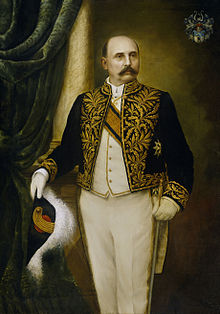J. B. van Heutsz
| Joannes Benedictus van Heutsz | |
|---|---|

Portrait of J. B. van Heutsz by Hannké (1908)
|
|
| Nickname(s) | "Pacificator of Aceh" |
| Born |
3 February 1851 Coevorden, Drenthe, Netherlands |
| Died | 11 July 1924 (aged 73) Montreux, Switzerland |
| Allegiance | Dutch |
| Commands held | Governor-general of the Dutch East Indies |
| Battles/wars | Aceh War |
Joannes Benedictus van Heutsz (3 February 1851 – 11 July 1924) was a Dutch military officer who was appointed governor general of the Dutch East Indies in 1904. He had become famous years before by bringing to an end to the long Aceh War.
Joannes Benedictus van Heutsz was born on 3 February 1851 in Coevorden in the Netherlands. He was the second son of Joannes Franciscus van Heutsz and Maria Lucilla Kocken. Both his father and grandfather were artillery officers.
Van Heutsz, who was a difficult and talkative student, went to school in Breda. His family could not afford to send him to the Royal Military Academy in Breda, so he later went to the Instruction Battalion in Kampen from 1867 to 1872.
Following twenty-five years of protracted warfare, Van Heutsz was appointed as Military Governor of Aceh. In consort with the Islamic scholar Christiaan Snouck Hurgronje, Van Heutsz succeeded in weakening the Acehnese resistance by exploiting tensions between the Acehnese aristocracy and the religious ulama. He also solicited the support of the Acehnese ruling classes while isolating the rebels from their rural bases. At the advice of an Acehnese noble, he also altered the tactics of the Royal Dutch East Indies Army by introducing small mobile forces which were successful against the guerrilla tactics of the Acehnese.
Van Heutsz commissioned Colonel Van Daalen with the challenge of breaking any remaining resistance. Van Daalen destroyed several villages, killing at least 2,900 Acehnese, among which were 1,150 women and children. Dutch losses numbered just 26, and Van Daalen was promoted. By today's standards, these actions would be considered war crimes. By 1903, Van Heutsz tactics had succeeded in convincing several secular Acehnese resistance leaders including Sultan Muhammad Daud, Tuanku Raja Keumala, Tuanku Mahmud and Teuku Panglima Polem Muda Perkasa to surrender to the colonial authorities. Having overcome the secular elements of the resistance, Aceh was declared by the Dutch to be officially pacified by 1903. Despite this, resistance from the ulama continued until 1913.
...
Wikipedia
